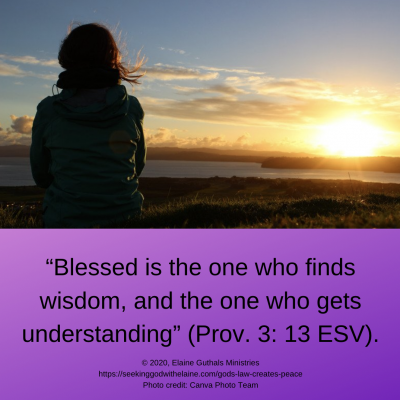When we think about God’s laws and commandments, we generally don’t think about peace. We think restrictions. This devotion looks at how we can put our faith in God’s laws because they do bring God’s peace.
Nuggets
- The law gives us wisdom.
- It is the battle between good and evil that takes away our peace.
- We have to do something with it – we have to change our character so that we are more like God.
- The greatest thing that can come out of God’s peace is the peace we receive when we are in the midst of trials.
Devotions in the Peace Leads to Tranquility series

We are just going to jump in because this got long. You may be questioning how I see God’s restrictive laws could even think about creating peace. I am going to quickly move to show you how I came to that conclusion.
Let's Put It into Context
We’ve talked about peace several times. Peace is an inward tranquility or composure of the mind resulting from a balanced life with spiritual order, equity, and truth.
Glossary
Peace isn’t just the absence of conflict. It is a positive condition.
God wants disciples of Christ to experience peace in the midst of conflict. We can do that when we put our faith and trust in Him.
Peace from Loving God’s Law
“Great peace have those who love your law …” (Ps. 119: 165 NIV)
We are going to form our discussion around what Jesus called the second greatest commandment as our example. “And a second is like it: You shall love your neighbor as yourself’” (Mt. 22: 39 ESV).
Jesus said that “on these two commandments depend all the Law and the Prophets” (Mt. 22: 40 ESV). That makes sense.
- If we don’t love God, we are not going to love God first and foremost, worship anything but Him, watch how we use His name, and find a community of people who believe like we do and meet with them regularly.
- If we don’t love people, we are going to not honor our parents, murder, steal, lie, and strongly desire what they have.
The law gives us wisdom. Wisdom is knowledge, discernment, and good sense that leads to goodness and virtue, which can be applied to life. “Blessed is the one who finds wisdom, and the one who gets understanding” (Prov. 3: 13 ESV).

Okay, let’s do some initial substituting. The law gives us knowledge and the ability to determine what is from God, which brings us standards of moral excellence that should be applied to our lives.
Having God’s wisdom will greatly benefit us. “Then you will experience God’s peace, which exceeds anything we can understand. His peace will guard your hearts and minds as you live in Christ Jesus” (Phil. 4: 7 NLT).
That peace will be proportional to the application of that wisdom in implementing God’s laws and commandments in our lives.
So, let’s do the deep substitution. The loving-others law gives us knowledge of how God wants us to treat those around us and the ability to to do that, which brings changes to our character making us more like Him, so that we can appropriately act and react to situations in our lives.
Okay, that may be a little convoluted. So, let’s break it down.
- The loving-others law tells us how God wants us to act.
- God gives us the ability to to do that.
- By following His laws and commandments, we become more like Him.
- It becomes second nature, so we act and react appropriately in situations in our lives.
But it is all proportional based on how we are following God. If we are all in, it is total peace. It we are a just-on-Sunday disciple, we probably don’t have much peace at all.
It is an all-in type of thing. Eldridge defined that for us. He wrote, “The law holds our entire being in its grasp — our heart, our secret acts, our words, our life, and there is no escape: nor is there any breaking of the law with impunity.”
Resource
Melvill also showed us what loving the law means. It is predicated on ifs. His words are in bold, except I substituted we for I.
- If we have reached the point of loving the law means it is a process.
- If we love God because He hates sin means we accept His authority to decide what is a sin and what isn’t.
- If we love God because He will punish sin means we agree that we should be held accountable for our actions.
- If we love God because He requires “holiness in the inward parts” means that we are attempting to change our character to imitate His.
Now, Melvill said there was more to loving God’s laws, but this is a good start.
Then — only then — do we get the good stuff. God will protect us. Sure, there will be accidents. We will get sick. But He is protecting us.
We have the wisdom God wants us to have so that we know Him — even the things He hasn’t revealed in the Bible.
Resource
Peace from the Do’s and Don’ts?
When we struggle with doing the do’s and not doing the don’ts, it is really a battle between good and evil. This battle steals our peace. Following God’s laws actually brings peace.
The Homilist’s nailed it. The Glowing Testimony of the Good says, “Moral remorse, malign passions, dark forebodings, battling impulses, these are the source of all inner tumult; but, in the nature of the case, where the soul is in a loving ruling sympathy with God’s law, such elements of distress cannot exist.”
Resource
When we are actively resisting the temptation to sin, God gives a peace. Spurgeon told us what that entails.
- “Great restfulness of the intellect.
- “A pacified conscience.
- “Peace in heart.
- “Peace as to our desires.
- “Peace in resignation to God, acquiescence in His will, and conformity to it.
- “A happy confidence in God as to all things in the past, the present, and the future.”
Resource
Let’s talk the flip side for a second. When we know we are not following God’s laws and commandments, we don’t have peace. “For day and night your hand was heavy on me; my strength was sapped as in the heat of summer” (Ps. 32: 4 NIV).
We pay the consequences for breaking God’s laws and commandments. One of the consequences is the loss of peace.
Even just the turmoil from the indecision of whether we are going to follow Hod’s laws and commandments steals our peace. “… But I would not have known sin if it were not for the law …” (Rom. 7: 7 CSB).
I hear what you are saying. “But Chick, you keep saying there is no way we are going to be able to keep all of the laws all of the time.” That is right. We can’t.
So, what do I tell you to do when you break God’s laws and commandments? We repent. Repentance is expressing sorrow for breaking God’s laws and commandments by making the commitment to changing ourselves through obedience so that we no longer do the wrong things.
When we repent, God will forgive us. Why? Because Jesus was the substitute for our sin. Pastor Tim said Sunday that He was penalized for us.
Glossary
Resource
But the peace comes by the regeneration. Regeneration is the change in us that God brings about when we go from being spiritually dead to spiritually alive.
Yes, we are changed from being spiritually dead to spiritually alive in an instant. Changing our character to the character of God means navigating the Sanctification Road. Sanctification is the transformation of mind, body, and soul beginning with regeneration and ending with perfected state of spiritual wholeness or completeness.
Glossary
What loving the law really does is takes away is our doubt. We no longer struggle with is God’s Word true or not — we know it is. We no longer have the clash of you-need-to-give-this-sin-up-BUT-I-DON’T-WANT-TO! We know the benefits when we do live like God wants us to live.
But hey. If you want to keep beating your head against the wall to defy God, go for it. He is not going to force You to follow Him.
But you won’t have true peace. Plus, you will pay the ultimate penalty in the end.
Peace Because the Law Shows Us God’s Character
“… and nothing can make them stumble” (Ps. 119: 165 NIV)
One of the purposes of the law was to show us God’s character. We learn of His character by seeking God with all our hearts.
Did you get the true meaning of loving the law yet? If we love something, we do something with it. If it is a person, we spend time with them. If it is an animal, we take care of it and nurture it so it can grow.
We have to do the same thing with the law. We have to do something with it. We have to change our character so that we are more like God.
We do that by seeking God. We spend time in His Word and really Study it. We go to Him in prayer. We meditate on what what He is telling us.
Searching for and Seeking God
Hearing His Word (Rom. 10: 17).
Reading His Word (Rev. 1: 3).
Praying to Him (Heb. 4: 16).
Studying His Word (Ac. 17: 11).
Meditating on His Word (Ps. 1: 1-2).
Memorizing His Word (Ps. 119: 11).
Let’s roost on stumbling blocks a second. A stumbling block is anything that makes someone be disobedient to God.
Let’s think of it this way. A trial gets dropped in our lap. Doubts can be a huge stumbling block. Misunderstanding what God’s Word actually says is right up there too. Another toe-stubber is our stubbornness in giving up our pet sin.
If we love God’s laws and commandments, we want to obey them. So when the drop occurs, we are ready for it.
Not only are we ready for the drop, we know all the nuances associated with the law. “It means this but not that.”
Peace While Following God's Law
Peace comes when we obey God’s Word. That includes obeying His moral laws.
Spurgeon brought up a good point. He wrote, “Love lies deep, it is in the heart: it is not a thing of the surface, it is of the man’s own self.”
Included was a list of the good things Spurgeon saw coming out of that love.
- An intense respect for it.
- A delight in it.
- A heart-felt acceptance of it.
- An appreciation for it.
Resource
I think the greatest thing that can come out of God’s peace is the peace we receive when we are in the midst of trials. We don’t have to be overwhelmed, scared, or dejected. We can put our faith and trust in God to protect us and provide for us.
We have to remember that peace is a result of obedience. No obedience, no peace.
That takes the focus off the circumstances and puts it on God. Isn’t that a great place for it to be since God is all-powerful, all-knowing, and all-present?
To read a related devotion, click on the appropriate button below.

Making the Connections
No, I don’t think it is normal to love God’s laws and commandments — at least not all of them. The Holy Spirit has to help us.
Well, doesn’t that make sense? If we can do it without God’s help, we wouldn’t need Him.
And we definitely need God.
God rewards those who keep His laws. Spurgeon wrote, “Great peace means great prosperity. Those who love God’s law have great blessedness in this life as well as in that which is to come. In loving the law of God we have intense enjoyment and real success in life.”
Resource
Making the Connections to Self-Discipline
If loving God’s laws and commandments only comes through the work of the Holy Spirit, that means it is something in which we will have to work. That means self-discipline will have to come into play to accomplish the work.
How Do We Apply This?
When we love God’s law, peace is produced. We shore up that peace by doing certain acts.
• We think deeply about what the law means and how we are to fulfill it.
• We defend it, regardless of what we think is our ability to do so or the consequences stemming from that defense.
• We repent when we break the laws and commandments.
• We accept any suffering that is associated with it.
• We stay on the Sanctification Road, because it leads to holiness and righteousness.
Resource
God loves us so much; He is going to provide us peace. We need to put our faith in Him.
Father. You provide so much for us. This includes the peace that You give us. Thank You. Amen.
What do you think?
Leave me a comment below (about this or anything else) or head over to my Facebook group for some interactive discussion.
If you don’t understand something and would like further clarification, please contact me.
If you have not signed up for the email daily or weekly providing the link to the devotions and the newsletter, do so below.
If God has used this devotion to speak with you, consider sharing it on social media.
Pingback: What Is Peace? – Seeking God with Elaine